Can you ‘manifest’ the perfect life? Zoe Marshall tries to convince us - and almost succeeds
The footballer’s wife turned spiritual guru, Zoe Marshall reveals the crippling details of her disorder, how she can now kiss her kids on the lips, her ‘love’ for a controversial herbalist, and why the Marshalls sleep in different rooms.
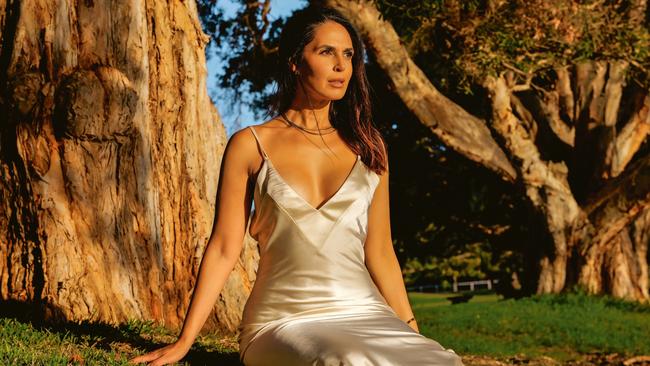
Back in the early days of Facebook an acquaintance of mine, a New Age type prone to making statements on the site such as “my aura just orgasmed”, posted a call for help. Did anyone have a place for her to stay in Byron Bay? She had arrived for a short holiday and suddenly found herself without accommodation. But a few hours later came a new post and a slew of photos of her poolside, bikini-clad and in lotus position. There was even a shot with a Buddha in a pond that was inside her luxurious room. All was well, she explained in the update, because she had manifested her perfect place to stay.
“Isn’t that called checking into a hotel?”, someone had written in the comments.
The idea that positive thoughts can transform your desires into reality isn’t new – karma theory came 3,500 years before superstar Dua Lipa told a crowd of 100,000 people that she had manifested her dream of a headline spot at Glastonbury in 2024 by “writing it down” early in her career. In a 2015 interview Oprah Winfrey told LinkedIn CEO Jeff Weiner an anecdote about craving tomato soup – and her neighbour suddenly appearing with a steaming bowl of it. “You control a lot by your thoughts,” Oprah said. “When I started to figure that out … I was like, ‘What else can I do? What else can I manifest?’ Because I have seen it work. I have seen it happen over and over again.”
Which brings me to the book Ariise: Manifest the Life You Deserve, by Zoe Marshall. In case you are not in Marshall’s orbit, she is a podcaster and social media presence with a devoted following for her candid and usually self-effacing Instagram posts. These chronicle her life as wife to NRL legend Benji Marshall, parenting two young children, and, latterly, her own brand of spirituality.
A video of Marshall, driving her family’s Porsche and posted to Instagram, shows her sending up soft, New Age spiritual wisdom in favour of a more rough-and-ready approach. She’s chaotic, funny and positive. And she says she wants to help you achieve your dreams.
Along with the book, Marshall has designed Ariise courses you can sign up to. She’s added to her two successful and enlightening interview-based podcasts (The Deep and The Deeper) a new one, Ariise, promoting her self-help method that, like most self-help systems, comes with its own lexicon. Co-create (manifest). Take “aligned action” (work hard). Look for “riisers” (people who inspire you). Try “priming” (pretending that what you want is already yours). Strive to become “neutral” (emotionally healthy). While there are no crystals or mantras here, she does tend to use the word “universe”.
How seriously are we meant to take this? Marshall has previously described Ariise as her “legacy business”. And it’s not a bad business to be in. Google data shows that searches for “manifesting” rose more than 600 per cent in the early days of the pandemic. On social media, especially TikTok, “manifesting influencers” (ie, influencers who help you to manifest) are ubiquitous. (They can also help you “manifest your way to being an influencer”).
The internet tells me that I can manifest my dream job by making a Pinterest board. I can also get a guy to text me back by saying his name a certain amount of times before I go to sleep. It sounds ridiculous, but “manifesting” was the Cambridge Dictionary’s word of the year in 2024, after 130,000 searches.
Let’s get something out of the way: Zoe Marshall does not say you can get the guy/job/car of your dreams by sticking pictures on a sheet of cardboard. There’s a process. She digs deep, citing journal studies on habit formation and drawing on the work of Dr Tara Swart, who has a medical degree from Oxford and wrote the self-help bestseller The Source, linking manifestation and neuroplasticity.

Marshall’s book is part memoir and she references her own life (two beautiful children, success in work, and a husband she describes as “the perfect man”) not to show off but as proof that her process works. She stresses that things weren’t always this rosy. “If you look at where I was and where I am now it just doesn’t make sense,” she explains. “I have to have the things that I have for people to be able to trust that it works. Otherwise they’d be asking, ‘Well, where is your f. king great life?’”
Also written as a practical, step-by-step guide (think Eckhart Tolle meets Elizabeth Gilbert) that comes with homework, Marshall’s book is not for the half-arsed. “You need to use your whole arse,” she writes.
I feel I know quite a lot about Zoe Marshall’s story even before I head to her beautiful home in Sydney’s inner west. There’s more than a decade of articles from newspapers and magazines charting her life and its milestones, not to mention her own 3400-plus social media posts. Thanks to Instagram I’ve seen her in labour with her second child. On her way to surgery to have a breast lump removed. Marrying Benji Marshall. Renewing her vows. Mourning the loss of her mother to cancer.
It’s raining heavily when I arrive on her doorstep where a parcel delivery is waiting, so when Marshall, gorgeous in a cream silk shirt, jeans and fluffy slides, opens her front door I hand it to her. “Thanks Amazon!” she says as she takes the parcel and shuts the door in my face. OK, so she’s beautiful, smart and a practical joker too. It’s a good start and I like her instantly. The rain has changed her plans and her three-year-old, Ever, who was supposed to be at the park, is at home with the nanny.
As we settle down to have our conversation, Ever tiptoes into the room. “Excuse me Mummy but I love you,” she says, giving her mum a gentle hug.
“I set that up,” Marshall says with a grin as Ever dances off and up the stairs.
Over four hours together she is warm and appears relaxed and candid. She’ll casually mention that she and her husband have never slept in the same bedroom – she thinks it’s unhealthy and she needs her space when she sleeps. She tells me that she has recently been diagnosed with OCD and is having Exposure and Response Prevention (ERP) therapy, a form of cognitive behavioural therapy. The therapy, which she says is gruelling, has led her to give up every vice “except for sex”, which she says makes sex even better. “That might also have something to do with being in my forties,” she says before leaning in to ask conspiratorially, “Have you read All Fours?” Yes I have. Because I’m also in my forties.
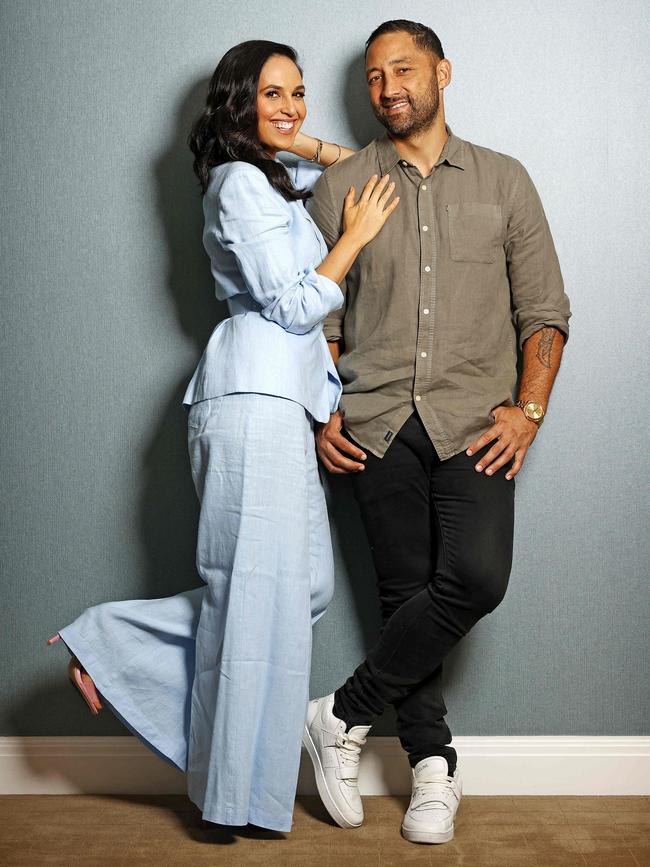
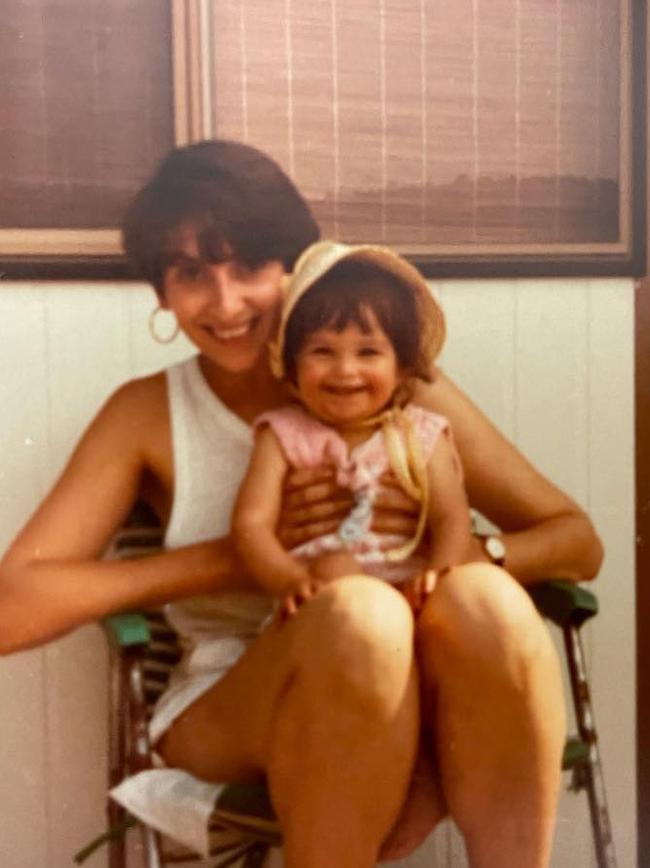
It’s a lot to take in. But we haven’t scratched the surface. Did I mention I really like her?
Marshall’s home is elegant and immaculate. She loves flowers and they are all around us, fulsome roses in the squeaky clean kitchen; a plume of hydrangeas on the table. There’s also a candle that Marshall is excited to tell me she made herself. “I have hobbies now. I’m doing things I’ve never done before! I didn’t value anything without an outcome – whether that was financial, on my to-do list, or to do with success. But last year everything changed.”
“Before” is before last June when, the day after her 40th birthday, Marshall had a 6.5cm non-cancerous lump removed from her breast. She says seeing her seven-year-old son Fox worry about her health brought back the traumatic memories of losing her mother, who died from breast cancer almost 20 years ago.
“The cancer scare was the turning point for me,” she says. “It made me ask, ‘Are you going to wait until something really bad happens or you’re on your deathbed or you’re retired, to live?’”
Marshall says she decided to pivot from “hustling” as a paid social media influencer. “It was soul sucking, but very lucrative financially. It was also confusing. People are willing to throw thousands of dollars for such low-effort work, and my mum made 20 bucks an hour … it almost felt disrespectful not to take the work,” she says.
“But I wasn’t allowing myself space to rest or play or do something just for creativity. My husband is great at golfing every week, and I’m so supportive. I’ll always make sure that somewhere in the week he’s doing that. And then I was like, ‘Oh, that’s so interesting. Would you put resources and finances into your own hobby?”
Vowing to be less busy, she wrote a book. Manifesting is something she’s always done, she says. “I’ve been practising [manifesting] for 20 years, but I’ve had so much shame around sharing it … because I was in media, and I know it’s f. king weird, so I suppressed it. I lived my life by it, but I didn’t tell people because I was worried what my peers would think. Now I don’t care if people think I’m a witch.”
By the way, Marshall wants it said for the record that she is not a witch. “I have never done wicca,” she yells into my recorder. I tell her I’m sceptical about manifesting. “I’m sceptical of everything!” she says. “I had a feng shui person here and I was totally sceptical until I felt it was OK for me. And parts of my book won’t feel OK for people. But you can take what you want and leave what doesn’t work. Even ten per cent can make a huge difference.
“Co-creating means collaborating with the universe, or a higher power. It could be mother nature, it could be God, energy … pick it and make it make sense for you. It doesn’t matter what you believe in.”
It was in 2006 that Marshall’s mother turned to her in their kitchen and told her that she had found a 5cm lump in her breast. Shortly thereafter, her mother sat her down to watch the documentary The Secret, based on the bestselling book by Rhonda Byrne, which sold over 30 million copies. That was the first time Marshall heard about manifesting.
“It was a revolutionary moment for people. You had to know someone who had the DVD to get your hands on it. The marketing was brilliant. Obviously there’s lots I don’t agree with, but it gave people access to something that wasn’t really understood 20 years ago. I didn’t understand it then. It finished and I was like … ‘Well, what was the secret?’ I didn’t get it.”
The Secret featured a woman claiming that she could cure her own cancer. Marshall is very quick to assert she does not believe this. “I don’t believe you can manifest life or death, babies or illnesses. The idea that I didn’t manifest hard enough for my mum to live? Or my friends who’ve lost their children didn’t? I have a real problem with that.”
A month after watching The Secret, her mother passed away. Marshall’s grief was monstrous, and it’s still palpable. “I always said that if my mother died, I’d kill myself,” she tells me. “I really believed that. She raised me as a single mum … it felt like it was us against the world. We were the only thing that mattered to each other.” (She saw her father semi-regularly, but they weren’t close and they aren’t in contact today.)
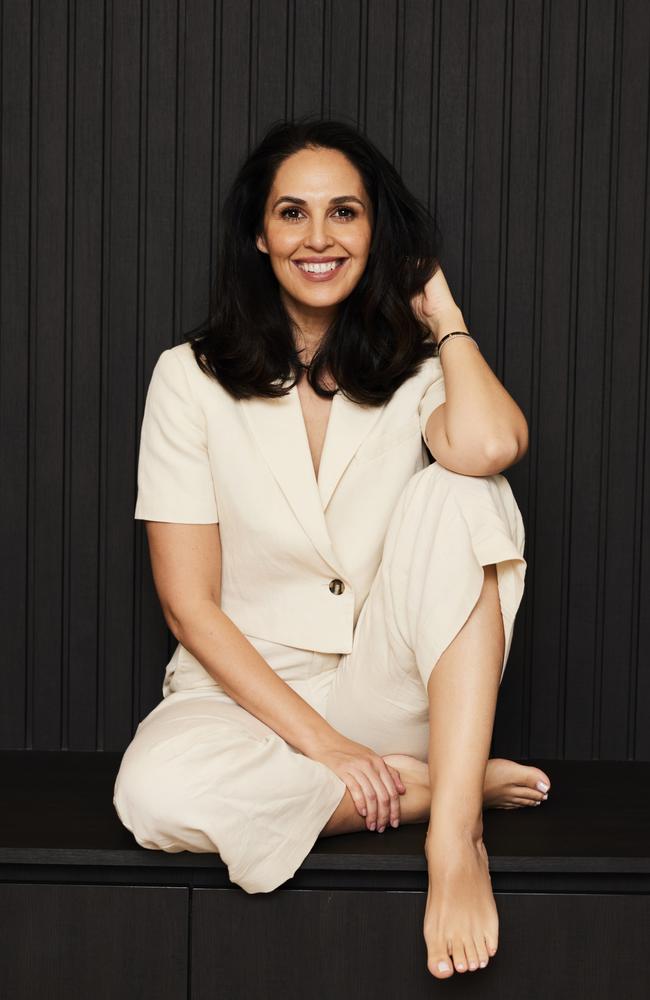
Marshall says she never told her dying mother that she was in an abusive relationship with a partner who raped and beat her and exercised financial and coercive control over her, something she first revealed with a splash in Sydney’s Daily Telegraph while six months pregnant in 2017. At the same time she also launched a fashion line to raise money for domestic violence charity.
Although she is vague about her exact age at the time of the relationship with the man she calls “my perpetrator”, there’s no doubt the violence is bound together with the trauma of her mother’s illness and it has cast a dark shadow. “I was in an incredible amount of pain. I was vulnerable. I was needy and I wanted to be saved,” she says.
During a particularly violent episode she tried to leave her partner. Driving in the rain she lost control of her car and was involved in a near fatal accident. After climbing out of the wreckage she called the person she had been running away from. Later, while she was lying in a hospital bed, he told her, “‘Nobody cares about you. I’m all you’ve got.”
“And I believed him,” Marshall writes. “I had no money, no car, and I was stuck in a brace.”
Finally, she found the strength to leave. “I didn’t know how to exist in the world. I was so eroded. I remember trying to figure out what I liked, because I had been told what to eat and where I could go, how I could dress. I had to have my hair up and never down. I wasn’t allowed to wear makeup or skirts or fitted clothing. It was almost like being born again.”
With nowhere to live, Marshall started visualising living in Sydney’s Cremorne Point, where she and her mother used to take long harbourside walks. A studio apartment popped up. “The apartment was covered in mould. It was about the size of this dining table,” she says, pointing to the table in her stylish, expensive home. “I had absolutely no money. I was surviving on two sausages a week. But in that apartment I felt limitless. I felt freedom. I was safe. It was then that I started to believe.”
Marshall, who had attended drama school with the dream of being a performer, then saw an ad for a TV show host. “I started to visualise myself living the end result, and began to believe it was my job before it was mine at all.”
She got the job and it was the start of a career that has spanned over 15 years hosting TV and radio shows in Australia and New Zealand.
So I have to ask, could it be possible that all of her achievements come down to the fact that she is preternaturally hard-working, driven, talented and beautiful? She’d mentioned she prepared hard for that job interview, researching the producers and the former hosts. She has even been known to drive the route to a new job before she gets it.
“Everyone has the same ability to co-create,” she says. “You don’t need to have privilege or be beautiful or have any resources to start with, except being at ‘neutral’. And I explain how to get there in the book.”
It doesn’t sound like she’s pushing a get-rich-quick scheme. “No one is coming to rescue you,” she says. “If you want that job, take action. Set up your CV properly.”
Zoe Balbi met Benji Marshall when he was 24 years old, playing rugby league for Sydney club Wests Tigers and grieving the loss of his father. She tells me they have had a therapist in their relationship from the first year to learn how to communicate and connect, describing her husband as “a gift from my mother. He is the greatest human being in the whole world, the most generous, kind, fair, strong, supportive …”
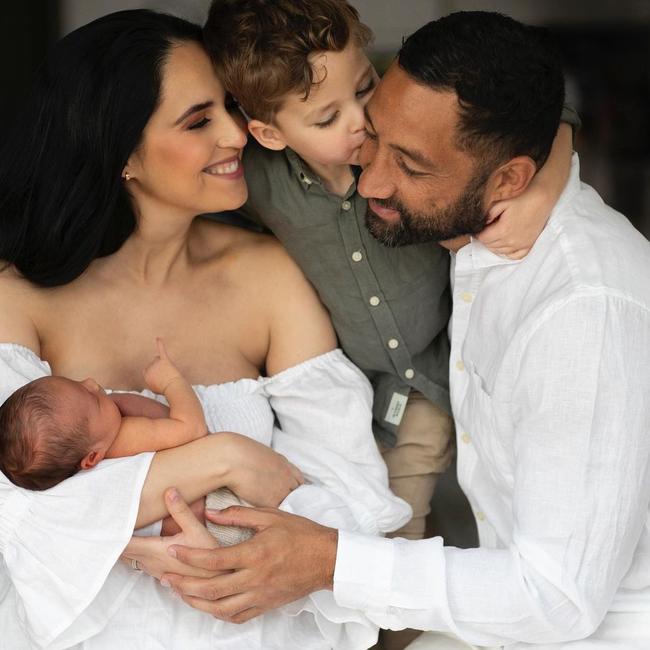
She trails off and smiles. “He’s just everything.”
I find it surprising that it took so long for Marshall to be diagnosed with OCD. She has spent decades living with emetophobia (an intense fear of vomiting). As a teenager she writes that she was unable to eat food outside of the house and she recalls wearing a scarf around her face at school, her hands cracked and chipped from compulsive washing. She says she ate snacks out of the packet by pushing the food all the way to the top because she was afraid to touch it with her fingers. As an adult she says the condition manifested in compulsive cleaning and hygiene. It’s only now, after a few months of therapy, that she can kiss her children on the lips.
“Benji says I am 80 per cent easier to live with since I started the therapy,” she says of her husband. “Can you imagine what I must have been like? The poor guy.”
It’s been a long, difficult road for Marshall and, as she assures me she doesn’t think she can cure cancer, I find myself making allowances for her when she strays into bizarre wellness territory. I understand that howling at the night sky could be cathartic – she has recently returned from leading a women’s retreat in the Hunter Valley, where, among other things, she called on attendees to scream under a full moon. “It wasn’t enough of a primal scream for me, so I forced them to go again and again until I felt it come from their loins,” she says visibly moved by the experience.
But I find her support for the banned Chinese herbalist Shuquan Liu alarming. Marshall has publicly attributed falling pregnant to Liu’s punishing two-week water and herb fast.
Liu, who also treated Malcolm Turnbull and his wife Lucy for weight loss, has been banned from practising for three years after “egregious” failures when a patient with a heart condition died while on one of his cleanses.
Marshall does not name Liu in her book, or in her conversation with me – “because he’s controversial” – but doubles down on support for the herbalist. “He’s very controversial but I love him,” she tells me, detailing the brutal regimen she says cured her of endometriosis; it sounds utterly counterintuitive for someone trying to fall pregnant.
“I’d take, like, I don’t know, 20 of these capsule herbs every day, sips of water and sips of black tea for two weeks. I licked Benji’s lamb chop bone – that felt like cheating! I was physically unable to drive. I was dizzy, I was so sore, physically sore and tender, incredibly irritable; a lot of repressed trauma came up, because I love to eat when I’m sad or feel uncomfortable.
“I felt like I was dying. I guess that’s the wisdom of his work, and that’s why it’s super controversial for me to talk about because Westerners don’t believe in water fasting. They don’t believe in all of these things that lots of different religions and cultures have been doing with great success for many years.
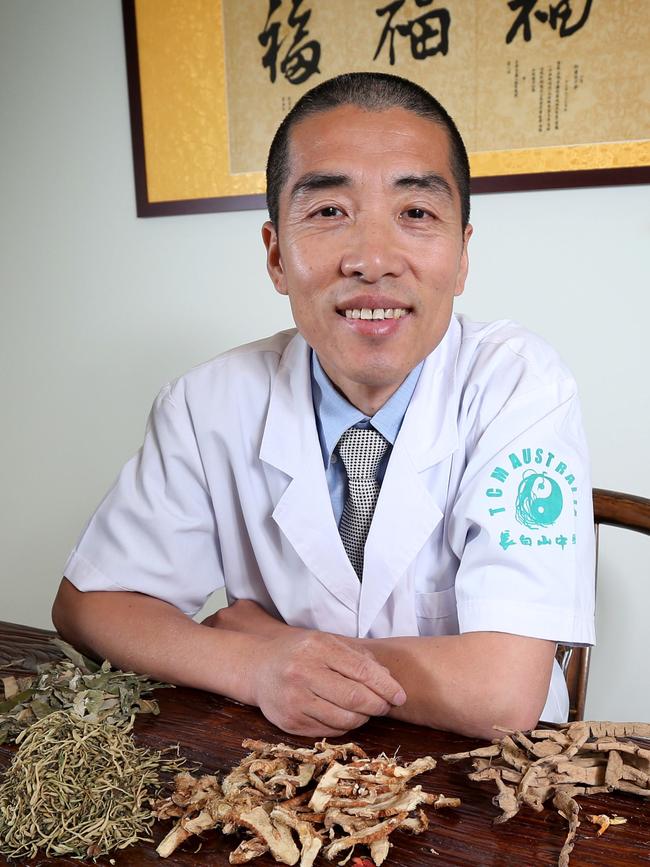
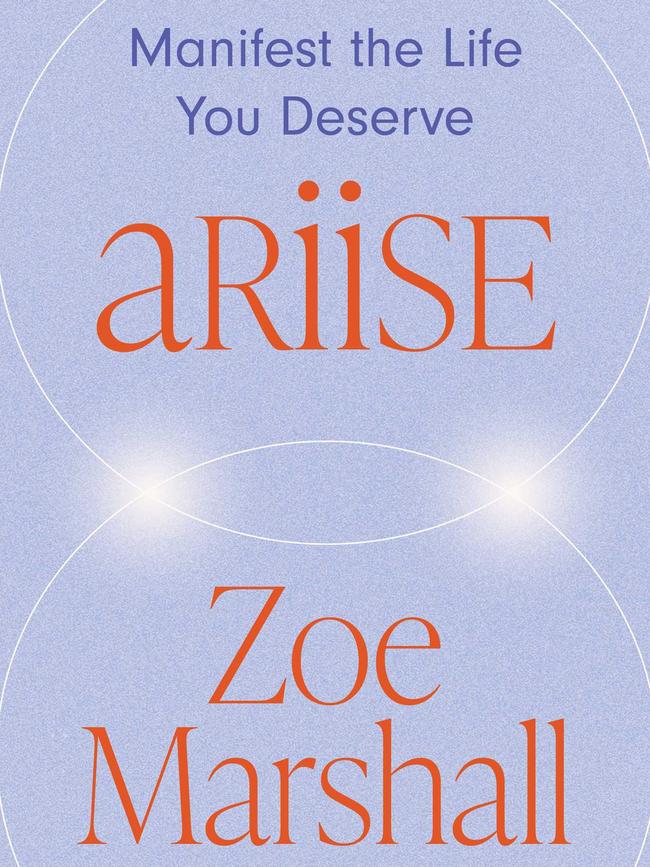
“It’s a very sad experience, and then it’s a very incredible experience, because my endo symptoms went and his whole theory is, if you starve the body, the cells have time to fix damaged parts. And obviously that has ancient wisdom attached to it, and maybe even scientific wisdom.”
But the NSW Civil and Administrative Tribunal, which banned Liu after an application from the Health Care Complaints Commission, found that his program isn’t recognised by Chinese medicine. The Tribunal said Liu, guilty of a “gross lack of care”, practised Chinese medicine “significantly below the standard reasonably expected of a practitioner” over the course of his sick patient’s 16 visits to his clinic.
“Whatever happened that caused him to lose his licence was because people dabble,” says Marshall, apparently unaware of the circumstances of the patient’s death and convinced she owes her fertility to Liu’s program. “You can’t dabble … there needs to be respect for the wisdom and the culture and the history of the practice, because they’re intense.
“For me, if you’re doing anything alternate outside of Western society, whether that’s plant medicine, whether that’s f. king with anything that’s not Western, you need to be super-duper respectful of whatever the cultural practices are, and you need to follow that stuff to a tee. You can’t just pop in and out – that’s when the danger occurs. And did occur, you know, for that situation. Not for me.”
The rest of the time, though, Marshall makessense – even her jargon has a certain logic. She’s highly intelligent, and seems wholeheartedly driven by a desire to help people. It’s searingly obvious to me that the dark shadow still looms over her. Nevertheless, her 200-plus page book will resonate with many who are in the process of facing up to their baggage, even just for its pop psychology. The practical advice is really about getting yourself in the best possible headspace to accept and move through life’s challenges. “Life is always going to happen. But when you aren’t super stressed you can access more resources. You have the ability to manage so much better if you’re not in fight-or-flight [mode].”
If I had to distil the Ariise method, I tell her, it would be this: work out what your core values are, what you honestly want to achieve and why, identify the thoughts and behaviours that might be blocking you, and then put in the hard work to deal with them.
“That’s it!” she says with excitement. “That’s the difference between being a co-creator or not. That’s the only thing I’m saying.”
But … but … isn’t Ariise and manifesting and all of it really just the power of positive thinking, goal-setting and hard work?
What if manifesting a hotel room is just checking into a hotel after all?
Marshall agrees some people might call her process a placebo effect, confirmation bias or mental rehearsal. “We can all call it something different, but it’s the same thing that the ‘one percenters’ do, whether it’s Oprah or Taylor Swift or Drake. They’re all doing this. It doesn’t matter what you call it. It’s being truthful about who you are and what needs to be healed. There’s nothing special about me. This has been around for centuries. This is very old news.”
Ariise: Manifest the Life You Deserve (Simon & Schuster, $36.99) is out on April 2

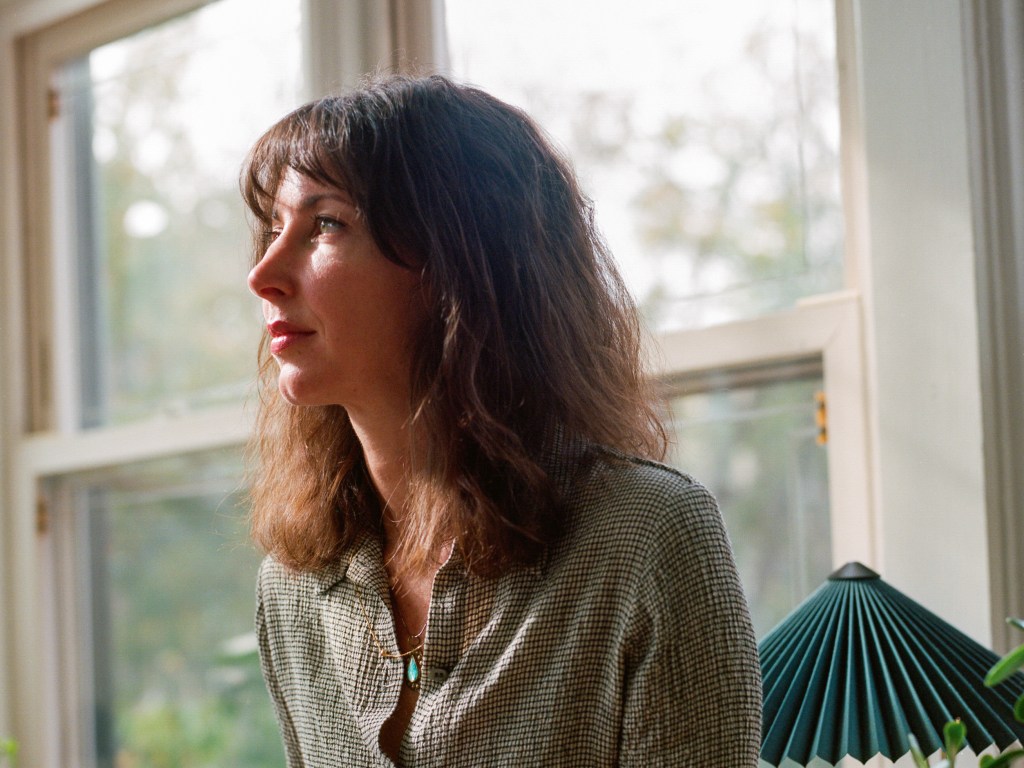


To join the conversation, please log in. Don't have an account? Register
Join the conversation, you are commenting as Logout